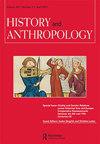加勒比地区的非洲档案:20世纪特立尼达的约鲁巴传统、文化专家和宗教知识的破坏
IF 0.4
2区 历史学
Q3 ANTHROPOLOGY
引用次数: 0
摘要
本文章由计算机程序翻译,如有差异,请以英文原文为准。
African archives in the Caribbean: the yoruba tradition, cultural experts, and the unmaking of religious knowledge in twentieth-century Trinidad
ABSTRACT Attending to how religious custodians, colonial agents, and scholars have exchanged knowledge across sites in Africa and the Caribbean during the nineteenth and twentieth centuries, this article raises questions about continuities and ruptures in religious traditions that challenge perceptions of homelands as sites of stable, originary knowledges/heritages and diasporas as sites of improvised and severed knowledges/heritages. Highlighting the Yoruba-Orisa1 religion in Trinidad as a rich diasporic site to work through these issues, I employ a transdisciplinary methodology to argue that historicizing and theorizing African heritage religions that have unfolded around and in the wake of the events of the transatlantic slave trade require comparative research methods – historical, sociolinguistic, phenomenological, decolonial, material cultural studies – that facilitate critical explorations of the multidirectional circulation of expert religious knowledge between Africa and its diasporas. In so doing, we can examine the Caribbean and the Americas not only as sites of African diasporic archives and religious history but also as archival diasporas of African continental religious and socio-political history.
求助全文
通过发布文献求助,成功后即可免费获取论文全文。
去求助
来源期刊

History and Anthropology
Multiple-
CiteScore
1.80
自引率
0.00%
发文量
41
期刊介绍:
History and Anthropology continues to address the intersection of history and social sciences, focusing on the interchange between anthropologically-informed history, historically-informed anthropology and the history of ethnographic and anthropological representation. It is now widely perceived that the formerly dominant ahistorical perspectives within anthropology severely restricted interpretation and analysis. Much recent work has therefore been concerned with social change and colonial history and the traditional problems such as symbolism, have been rethought in historical terms. History and Anthropology publishes articles which develop these concerns, and is particularly interested in linking new substantive analyses with critical perspectives on anthropological discourse.
 求助内容:
求助内容: 应助结果提醒方式:
应助结果提醒方式:


